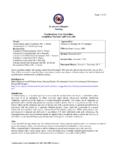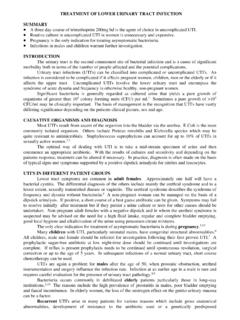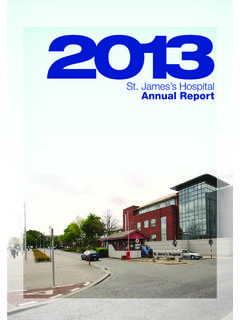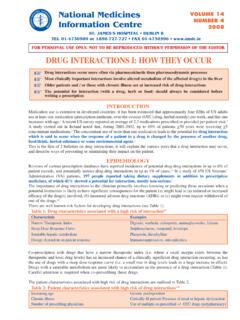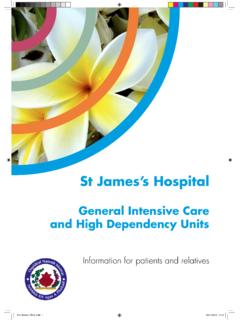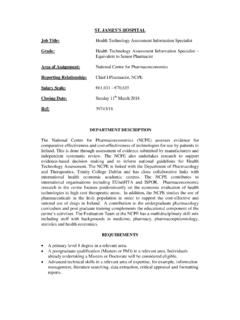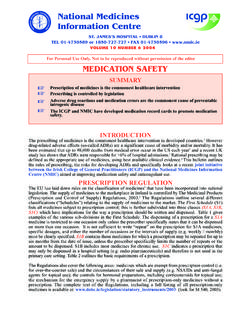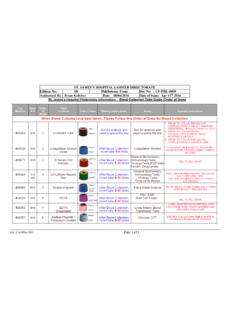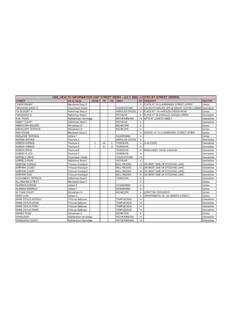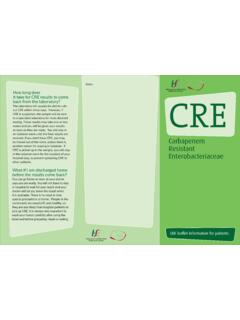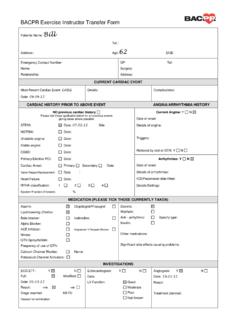Transcription of ST. JAMES’S HOSPITAL KEITH SHAW CARDIAC SURGERY …
1 Information for Patientswho are waiting for heart surgeryST. JAMES S HOSPITALKEITH SHAWCARDIAC SURGERYUNIT2 IntroductionThis booklet has been written to help you understand about your operation, the preparation before your operation, andthe care you will receive afterwards both in the intensive care unit and on the ClinicDuring this pre-admission clinic you will be assessed and fully prepared for SURGERY . You will meet several members ofthe multi-disciplinary team who will care for you during your HOSPITAL you will have an ECG and Chest X-ray performed. Blood samples will be taken and your blood pressure andweight will be recorded. You will also have swabs taken to test for MRSA (Meticillin-Resistant Staphylococcus Aureus).You will then be seen individually by the following team members:The Advanced Nurse Practitioner or Senior House OfficerTo examine you and make sure all your tests have been carried AnaesthetistTo assess your lung function and to explain about the drugs you will be given during the operation.
2 You will beasked about previous operations and if you have any PharmacistWho will make a record and discuss your present medications with you. Please bring the medication boxes withyou with labels on how to take the medication on them, including inhalers, creams and eye-drops, and the phonenumber of your local Social WorkerWill discuss your plan for discharge post your heart SURGERY . They will provide information regarding any assistancewhich may be needed a group you will recieve a 10-15 minute talk from the following:The PhysiotherapistWill see you to teach you about deep breathing, coughing and exercises which are important following CARDIAC Rehabilitation NurseWill provide an introduction to CARDIAC rehabilitation and leading a healthy lifestyle after your heart Clinical NutritionistAclinical nutritionist will provide dietary help and advice after your heart Advanced Nurse Practitioner (ANP)Will give a brief outline of what will happen from the day of your admission to the day of discharge.
3 She will giveyou a clear description of what will occur during KEITH Shaw CARDIAC SURGERY UnitThis unit is comprised of a 15 bed ward and 6 bed ICU that specialises in the care of patients undergoing cardiacsurgery. You will be admitted to the ward the day prior to SURGERY . Following SURGERY you will stay in the ICU for the first 6-24 hours, then transfer to the High Dependency section of the ward for the next 24 hours. Finally you will then spendthe next 4-5 days recovering on the wardYou will meet many different healthcare providers during your stay on the following will help you identify who is SisterDark Blue TunicNavy TrousersStaff NurseLight Blue TunicNavy TrousersStudent NurseWhite TunicBlue TrousersNurse PractitionerWhite TopNavy TrousersWard AttendantsWhite TunicBurgundy/Grey TrousersWard ClerkNavy SuitMeal amCoffee/Teamid afternoonSupper5-6pmYou are given a choice of main course at each for admission to the HOSPITAL Ring the ward after (01) 4103389, the day before your admission to confirm a bed.
4 You may be asked toreconfirm your bed again the morning of your admission DO NOT BRING ANY VALUABLES WITH YOU TO HOSPITAL . Bring wash bag, pyjamas, nighties, towels, dressing gown and slippers (we would recommend supportive non-underwire bras for the ladies). We encourage patients to send as much property home with relatives aspossible. Bring a list of your medication with you, no need to bring medications. There is strictly no visiting between each day, as you will be very tired and a rest period isencouraged. We also recommend that relatives do not visit for the first few mornings as you will be busy havingphysio and having tubes and drains removed. If you are on Warfarin or Plavix check with the ward as to when you should stop taking it prior to youroperation. Please make this enquiry as soon as you get a date for your for SurgeryWhen you are admitted to the HOSPITAL a nurse will talk with you and your family about what you can expect while youare in the HOSPITAL .
5 This is often a very busy day with visits from the following:The SurgeonTo discuss your operation and answer any questions you may ANP or House officerTo examine you and make sure all your tests have been carried AnaesthetistTo assess your lung function and to explain about the drugs you will be given during theoperation. You will be asked about previous operations and if you have any assist you with a will be given a body shave. The nurse/attendent will tell you which areas they will needto shave. You will also be asked to have a shower or bath with a medicated soap PLAN OF CAREis outlined on the next few pages. We use integrated care Guide to Integrated Care Pathways for CardiacSurgery PatientsAn integrated pathway is designed to plan your care more systematically. It is used by doctors, nurses, physiotherapistsand any other healthcare professional you might meet during your stay in St. James s HOSPITAL CARDIAC SURGERY is a guide of what might happen to DAY BEFORE SURGERY : On arrival to the ward you will be allocated and shown to your bed.
6 The nursing staff will introduce themselves and other patients to you. Anurse will come and talk to you and tell you what to expect when you wake from your operation. You will also be assisted to be prepared for your SURGERY shave and DAY: You will be fasting from midnight prior to your operation. You will need a shower before your operation You will be given a pre-med before your transfer to the theatre and this will make you feel a little drowsy. You will return to the Intensive Care following your SURGERY where you will be monitored closely for the first 6-24hour periodDAY ONE POST OP: You will be transferred to the High Dependency unit on KEITH Shaw ward. You will still require oxygen day one post op and this will be administered via an oxygen mask. In order to monitor your heart rate you will be attached to a heart monitor, your blood pressure and pulse will berecorded every two hours, or more frequently if necessary.
7 You may have pacing wires in your chest. These can be used to assist your heart if your heart rate is slow postoperatively. You will have an intravenous line in your neck and your arm through which you may be administered somemedications. You will have drains in your chest to drain any excess blood. Aurinary catheter will be in situ and your urine output will be measured and recorded every hour. This is tocheck that your kidneys are working properly and blood supply around your body is adequate. Fluids and a light diet are The Physiotherapist will see you and perform breathing exercises with you and will sit you out in a chair. Youwill have Elastic Stockings on until you are fully mobile. You will have a Chest X-ray, ECG and some bloods TWO POST OP: You will be transferred out of the High Dependency unit into one of the ward bay areas. You will be disconnected from the heart monitor today, neck lines and urinary catheter will be removed.
8 Yourheart rate and blood pressure will be taken and recorded every six hours. You will sit out of bed for longer periods of time today and you will be able to gently mobilise around your THREE POST OP: Your heart rate and blood pressure will be taken and recorded every six hours. your sternal and leg (if applicable) dressings will be changed. You will have an assisted shower. You will sit out of bed for longer periods of time today and you will be able to gently mobilise around your FOUR POST OP: By this time you will be able to mobilise all around the ward area. Today you will have an ECG, Chest X-ray, and blood tests, to check if everything is all right before you gohome. If you have had valve SURGERY you will also have an echocardiograph on Day 4. Your pacing wires will be removed today. The CARDIAC Rehabilitation Sister will see you today and talk to you about your local rehabilitation programme. Your heart rate and blood pressure will be taken today and recorded twice daily.
9 You will be given a discharge advice booklet to read so that you can prepare for discharge FIVE POST OP: If everything has gone to plan you will be discharged home today. By this time you will be able to mobilise independently and the Physiotherapist will walk the stairs with you. ThePhysiotherapist will also give you advice regarding progression of exercise after your discharge. You will attend a discharge talk given on the ward by the CARDIAC rehab The Pharmacist will go through your medications and give you a green medication card. The dietician will advise you on(a) A guide to nutrition immediately after your SURGERY to help optimise your recovery.(b) Long term heart healthy eating is the expected course for patients undergoing CARDIAC SURGERY . However as every patient is treatedindividually your post operative course may talks:Talks are given twice a week for you and your is wise to attend so that you understand what you should and should not do once you get the nurses for details about when the talks are aim of a bypass operation is to relieve you of SURGERY you will not require your GTN should now be able to get back to a full and active lifeDischarge HomeThe process of planning your discharge commences on admission to the HOSPITAL .
10 You need to organise who is going tocollect you from HOSPITAL once you are discharged, as an ambulance service is not provided unless you are beingtransferred to another expect you will be discharged from HOSPITAL 5 or 6 days after your operation. If you live alone we request you have afamily member or friend stay with you for at least a week after your SURGERY . If this is not possible please let us know assoon as possible so that alternative arrangements can be discharge please contact the ward on 01 410 3389 if you have any queries or telephone numbers: KEITH Shaw Ward01 410 3389 KEITH Shaw Intensive Care01 410 3398 Advanced Nurse Practitioners01 410 3338 Please phone at any time (except between - and - as the ward rounds are taking place). It isrecommended to have one key spokesperson per - - (afternoon visiting is more suitable for the patients).Strictly no visiting between - as this is the patients rest Care and High Dependency the visitors per bed are restricted to adhere to the hand hygiene recommendations displayed throughout the HOSPITAL .
